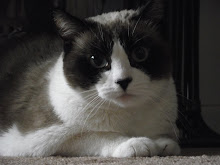Courage in a Crisis
I just finished watching Battlestar Galactica this weekend; in the final episode, Admiral Adama asks for volunteers to go on a rescue mission that might result in their deaths. Gaius, who has spent all of season four (I haven’t seen the other seasons, so I don’t know what he was like previously) being a sniveling coward who only looks out for his own self interest, has a conversation with one of the heroes of the show in which he’s confronted with the reality that he thinks and acts only for himself. Following this revelation he decides to become one of the volunteers in this suicide mission. And, although I appreciate that the writers kept him as a nervous, frightened fighter, I would have been more interested had he remained selfish and self-centered to the end.
That’s the darkness in humanity we don’t always like to think about. In times of crisis, there are a great many who do rise above the circumstances and surprise even themselves with their acts of courage. But that’s not the full story. There are those who are frozen in place and those who become cruel and malicious. When it’s “lay-it-all-on-the-line-time” can you really be sure which side you’ll be on? Can you really know who you will show yourself to be?
In Saving Private Ryan, do you remember the soldier who cannot make himself face his fears and shoot his weapon even though he can hear his friend being killed? In The Red Badge of Courage, young Henry spends a great deal of the book spoiling for a fight and then ends up running away in the fear and confusion of his first battle. He rationalizes that the battle was lost anyway and his sacrifice would have been meaningless, then fakes a wound to explain away his absence from the front lines when he realizes that his battalion has actually won. In both works, the characters get a second chance to redeem themselves. However, I’d like to see more time spent on characters who do not.
What about a guy who leaves a burning building to save himself and leaves behind his own child? The audience could never forgive or like such a man. Partly, it is that we find such cowardice revolting. But could it be that we don’t want to face that maybe—just maybe—under the right circumstances we ourselves could be that cowardly?
On some level, it’s great to think about what we might be able to do given the chance. It is unlikely that any of us will ever have to face ourselves in the midst of such a crisis. But what about the hints of who we really are that we see during a thousand small disasters that we face during the course of a week? When we’re cut off in traffic? When precious time is wasted in a long line? When someone has treated us unfairly?
I know what I am like. I know that I am certainly not heroic or courageous when things do not go my way. When I’m hurt, I become a hermit. When I’m stressed, I lose my temper very easily. In times of deep emotional strife, I take care of myself first.
Oh, I’d love to think that in a crisis, I’d rise above all that and do the right thing. But I don’t really know. And even if I did, would that one act of courage be enough to redeem the years of self-centered behavior that I rationalize with “well, I’m having a really bad day.”
It is more heroic to face the little irritants of life consistently with grace and compassion than it is to have that one moment of courage in a crisis.

